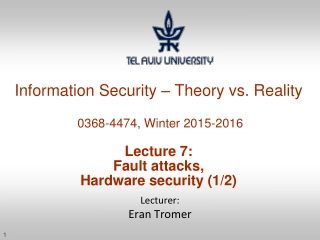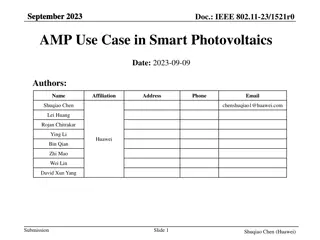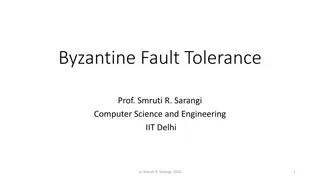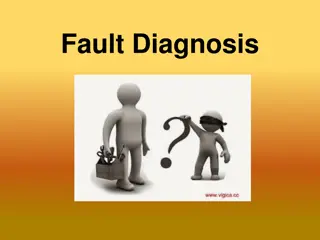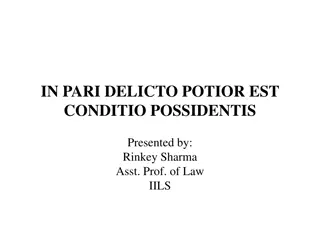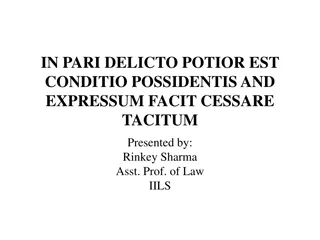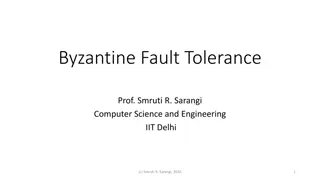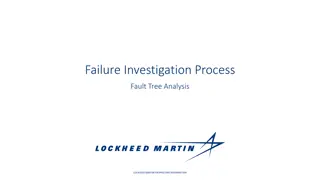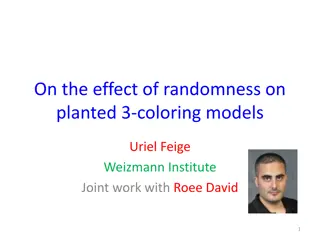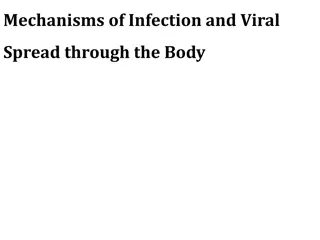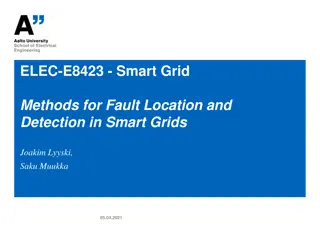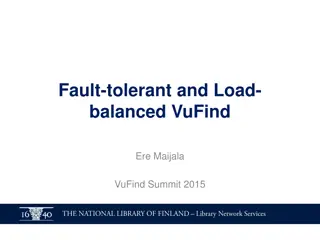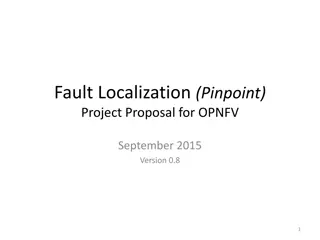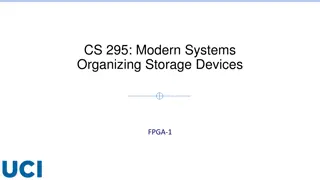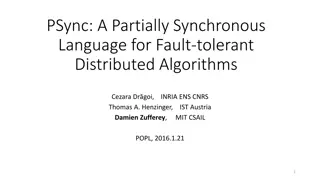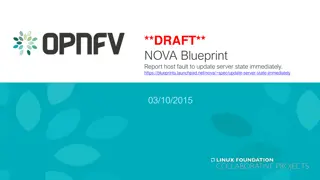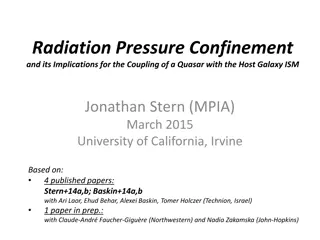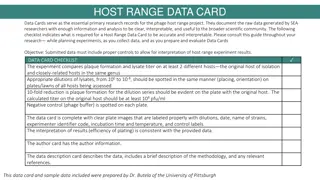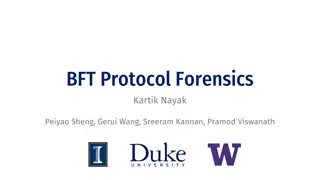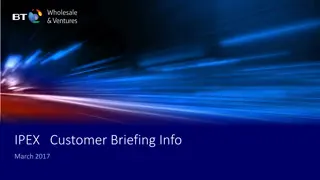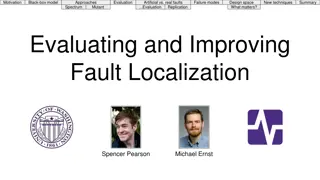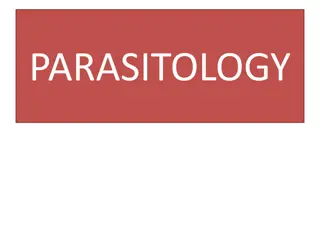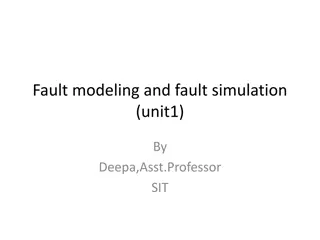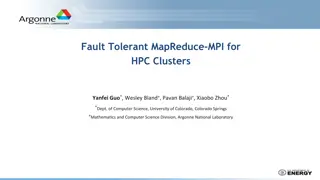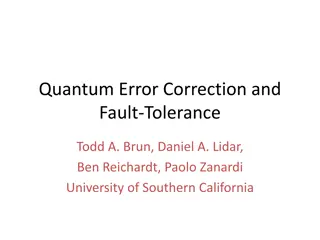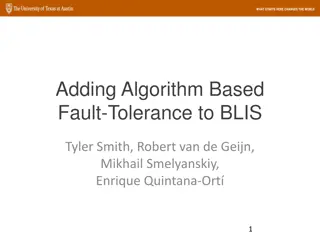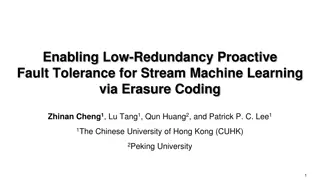Information Security – Theory vs. Reality
Exploring the concept of fault attacks in hardware security, this lecture delves into the various techniques used to compromise systems through non-nominal and nominal channels, as well as the potential risks introduced by trojan horses in the IT supply chain. The discussion includes differential fa
2 views • 37 slides
Cisco Systems Fault Managed Power Portfolio Overview
Cisco Systems offers an industry-leading Fault Managed Power (FMP) patent portfolio comprising 24 active assets across seven INPADOC families. The portfolio includes patents supporting fault-managed power systems, PoE deployments, DC power distribution, DC-DC conversion, and HVDC connectors. The FMP
4 views • 4 slides
Overview of Distributed Systems: Characteristics, Classification, Computation, Communication, and Fault Models
Characterizing Distributed Systems: Multiple autonomous computers with CPUs, memory, storage, and I/O paths, interconnected geographically, shared state, global invariants. Classifying Distributed Systems: Based on synchrony, communication medium, fault models like crash and Byzantine failures. Comp
9 views • 126 slides
Power System Fault Calculation and Protection Analysis
In this technical document, we delve into the calculation of fault current and fault apparent power in symmetrical three-phase short circuit scenarios within power systems. Through detailed equivalent circuit diagrams, reactance calculations, and per unit value derivations, the fault current and app
5 views • 15 slides
Smart Photovoltaics: Enhancing Fault Detection and Positioning
Smart photovoltaics (PV) technology aims to improve fault detection and positioning in large-scale PV systems. By equipping PV modules with AMP devices, real-time monitoring of environmental conditions and system status is enabled. The proposed automated troubleshooting method enhances efficiency in
0 views • 8 slides
Understanding Host Bibliographic Records in Alma/Primo VE
Explore the concept of Host Bibliographic Records in the Alma/Primo VE system, which address the issue of linking single items to multiple bibliographic records. Learn how host bibs work, their creation during data migration, implications for library services, and the various types of host bibs used
1 views • 24 slides
Understanding Byzantine Fault Tolerance in Distributed Systems
Byzantine fault tolerance is crucial in ensuring the reliability of distributed systems, especially in the presence of malicious nodes. This concept deals with normal faults, crash faults, and the challenging Byzantine faults, where nodes can exhibit deceptive behaviors. The Byzantine Generals Probl
0 views • 29 slides
Understanding Fault Diagnosis in Mechanical and Electrical Systems
Explore the essential methods and techniques for fault diagnosis in mechanical and electrical systems in industrial settings. Learn to identify different types of faults, utilize fault-finding aids, and rectify issues promptly to prevent future failures. Discover industry-recognized fault diagnosing
2 views • 27 slides
Doctrine of In Pari Delicto in Legal Context
The doctrine of in pari delicto (Latin for "in equal fault") dictates that when parties are equally at fault, the possessor's condition is considered better, meaning a person engaged in wrongdoing cannot sue another for the same act. Exceptions include the adverse interest and innocent insider excep
0 views • 4 slides
Understanding the Legal Maxims In Pari Delicto and Expressum Facit Cessare Tacitum
In Pari Delicto Potior Est Condicio Possidentis is a Latin phrase meaning "in equal fault, better is the condition of the possessor." It signifies that when parties are equally at fault, the possessor has the advantage. Expressum facit cessare tacitum, another legal maxim, states that what is expres
0 views • 6 slides
Customer Controlled SFI (CCSFI) Fault Raising Guide
This guide by British Telecommunications plc provides detailed instructions on raising a Customer Controlled Special Faults Investigation (CCSFI) fault. It covers topics such as Version Control, Best Practices for Knowledge Based Diagnostics (KBD) and CCSFI, logging in, and step-by-step guidance for
0 views • 19 slides
Understanding Byzantine Fault Tolerance: A Comprehensive Overview
Byzantine Fault Tolerance (BFT) is a critical concept in computer science, addressing faults in distributed systems. This summary covers the types of faults (normal, crash, Byzantine), implications of Byzantine faults, Byzantine Generals Problem, impossibility results, and the complexity of solving
3 views • 29 slides
Unified Volunteering Platform: Host Entity Account Management Training Update
Explore the recent updates in the Unified Volunteering Platform focusing on Host Entity account management training, webinars for UN Host Entities, and the launch of new self-service features. Learn about the roles within Host Entity accounts and the transition to the new system. Contact support for
0 views • 7 slides
Understanding Fault Tree Analysis for Failure Investigation
Fault Tree Analysis (FTA) is a method used to identify the root causes of failures, allowing for appropriate corrective actions to be taken. It involves creating a visual diagram to determine the primary cause of an issue and its contributing factors. FTA helps enhance communication between users an
1 views • 6 slides
Understanding Host-Parasite Relationship in Microbiology
In microbiology, the host-parasite relationship is crucial for understanding diseases caused by pathogens. This lecture covers definitions of terms like pathogenicity, pathogen, disease, resistance, susceptibility, infection, virulence, and transmissibility. It also delves into the division of host
0 views • 16 slides
Guide to Raising a Fault with British Telecommunications plc
This guide by British Telecommunications plc provides detailed instructions on raising a fault, including best practices, version control, and using Knowledge Based Diagnostics (KBD) for diagnosing 21C copper and fibre broadband issues. It covers logging in, running KBD, accessing fault reporting to
0 views • 15 slides
Understanding Host Stars and Their Importance in Exoplanet Research
Host stars play a crucial role in determining the physical parameters of planets they host, impacting exoplanet characterization and planet formation understanding. Data from astrometry, photometry, and spectroscopy, combined with stellar evolutionary models, help derive host star properties critica
0 views • 51 slides
Understanding Seismic Source Parameters in Earthquake Dynamics
The seismic source parameters in earthquake dynamics involve describing a fault as a discontinuity causing displacements, requiring a complex treatment of forces. The Earth's equilibrium necessitates a specific system of forces to explain displacements along faults. The seismic moment tensor, consis
4 views • 32 slides
Understanding MapReduce in Distributed Systems
MapReduce is a powerful paradigm that enables distributed processing of large datasets by dividing the workload among multiple machines. It tackles challenges such as scaling, fault tolerance, and parallel processing efficiently. Through a series of operations involving mappers and reducers, MapRedu
7 views • 32 slides
Exploring the Impact of Randomness on Planted 3-Coloring Models
In this study by Uriel Feige and Roee David from the Weizmann Institute, the effect of randomness on planted 3-coloring models is investigated. The research delves into the NP-hard nature of 3-coloring problems, introducing a hosted coloring framework that involves choices like the host graph and th
0 views • 55 slides
Understanding Mechanisms of Viral Infection and Spread
Viral infection involves a replicative cycle within the host, leading to a range of cellular responses from no apparent effect to disease. Factors such as virulence genes, host characteristics, and viral genome influence the pathogenicity and virulence of a virus. The process includes entry into the
0 views • 16 slides
Fault Location and Detection in Smart Grids
Fast and accurate fault detection and location are crucial in power grid management, especially in smart grids with bidirectional power flow. This study explores various fault location methods including impedance-based and travelling waves-based approaches. It also discusses the use of Intelligent E
0 views • 10 slides
Fault-tolerant and Load-balanced VuFind Project Overview
Project Background: Part of the National Digital Library initiative, the VuFind project aims to provide a discovery interface for Finnish archives, libraries, and museums. It started development in 2012 due to the insufficiency of existing commercial products. The focus is on enhancing fault toleran
1 views • 19 slides
Fault Localization (Pinpoint) Project Proposal Overview
The Fault Localization (Pinpoint) project proposal aims to pinpoint the exact source of failures within a cloud NFV networking environment by utilizing a set of algorithms and APIs. The proposal includes an overview of the fault localization process, an example scenario highlighting the need for fau
0 views • 12 slides
Understanding RAID 5 Technology: Fault Tolerance and Degraded Mode
RAID 5 is a popular technology for managing multiple storage devices within a single array, providing fault tolerance through data striping and parity blocks. This article discusses the principles of fault tolerance in RAID 5, the calculation of parity blocks, handling degraded mode in case of disk
0 views • 12 slides
PSync: A Partially Synchronous Language for Fault-tolerant Distributed Algorithms
PSync is a language designed by Cezara Drăgoi, Thomas A. Henzinger, and Damien Zufferey to simplify the implementation and reasoning of fault-tolerant distributed algorithms. It introduces a DSL with key elements like communication-closed rounds, an adversary environment model, and efficient runtim
0 views • 22 slides
Enhancing Server State Detection in OpenStack for Immediate Host Fault Reporting
This blueprint proposes the development of a new API in Nova to promptly update the server state in OpenStack when a host fault occurs. The intention is to ensure reliability and real-time updates of server and host states for Telco-grade VIM, allowing users to take necessary actions swiftly in case
0 views • 5 slides
Understanding Radiation Pressure Confinement in Quasars and Their Host Galaxies
Jonathan Stern's research explores the implications of radiation pressure confinement on the interaction between quasars and their host galaxies, focusing on photo-ionized gas systems. Through modeling and analyzing various properties of these systems, the study offers insights into quasar feedback
0 views • 35 slides
Guidelines for Host Range Data Card Creation in Phage Research
Essential checklist for creating accurate and interpretable Host Range Data Cards in phage host range projects, detailing required experiment components, controls, data documentation, and analysis. The provided checklist ensures the inclusion of necessary information and proper formatting for clear
0 views • 6 slides
Understanding the Complexities of Parasite Life Cycles and Host Interactions
Parasites exhibit diverse life cycles and behaviors, with cycles ranging from domestic to sylvatic environments. Factors influencing parasite diseases include host specificity, immunity, and host-parasite interactions. Parasitism can alter host behavior, impacting ecological dynamics. Immunology pla
0 views • 9 slides
Byzantine Fault Tolerance: Protocols, Forensics, and Research
Explore the realm of Byzantine fault tolerance through protocols like State Machine Replication and HotStuff, discussing safety, liveness, forensic support, and the impact of Byzantine faults. Dive into decades of research on achieving fault tolerance and examining forensic support in the face of By
0 views • 24 slides
Upcoming Changes to IPEX Fault Reporting Journey
This pack explains the upcoming changes to the IPEX fault reporting journey for customers. A new BT Wholesale Voice Products Ordering and Support System will be introduced in March 2017. Customers will need to transition to the new online IPEX fault reporting journey via the BTWholesale.com web port
0 views • 6 slides
Life Cycle of Ascaris lumbricoides in Human Host
Ascaris lumbricoides, commonly known as roundworm, is a human parasite found in the intestine. The life cycle involves copulation, egg development, and infection of a new host through ingestion of eggs. It does not require an intermediate host. The larval stages undergo migration within the body. Th
0 views • 14 slides
Exploring Fault Localization Techniques in Software Debugging
Various fault localization techniques in software debugging are discussed, including black-box models, spectrum evaluation, comparison of artificial and real faults, failure modes, and design considerations. The importance of effective fault localization and improving fault localization tools is hig
0 views • 24 slides
Understanding Parasitology: The Study of Organisms Living on or within Hosts
Parasitology is the study of parasites, which are organisms that live on or within a host and derive nutrients from them without benefiting the host. Parasites can be classified as ectoparasites or endoparasites based on their location in or on the host. Hosts play a crucial role in the life cycle o
0 views • 23 slides
Comprehensive Overview of Fault Modeling and Fault Simulation in VLSI
Explore the intricacies of fault modeling and fault simulation in VLSI design, covering topics such as testing philosophy, role of testing in VLSI, technology trends affecting testing, fault types, fault equivalence, dominance, collapsing, and simulation methods. Understand the importance of testing
0 views • 59 slides
Fault-Tolerant MapReduce-MPI for HPC Clusters: Enhancing Fault Tolerance in High-Performance Computing
This research discusses the design and implementation of FT-MRMPI for HPC clusters, focusing on fault tolerance and reliability in MapReduce applications. It addresses challenges, presents the fault tolerance model, and highlights the differences in fault tolerance between MapReduce and MPI. The stu
1 views • 25 slides
Quantum Error Correction and Fault Tolerance Overview
Quantum error correction and fault tolerance are essential for realizing quantum computers due to the challenge of decoherence. Various approaches, including concatenated quantum error correcting codes and topological codes like the surface code, are being studied for fault-tolerant quantum computin
0 views • 19 slides
Enhancing Fault Tolerance in BLIS with Algorithm-Based Techniques
Addressing the challenge of soft errors in supercomputers, this paper introduces algorithm-based fault tolerance methods to enhance the resilience of systems like BLIS. By integrating Application-Based Fault Tolerance (ABFT) into BLIS, the study aims to improve error detection and correction mechani
0 views • 48 slides
Low-Redundancy Proactive Fault Tolerance for Stream Machine Learning
This study focuses on enabling fault tolerance for stream machine learning through erasure coding. Fault tolerance is crucial in distributed environments due to worker failures, and existing approaches like reactive fault tolerance and proactive replication have drawbacks. The use of erasure coding
0 views • 20 slides
